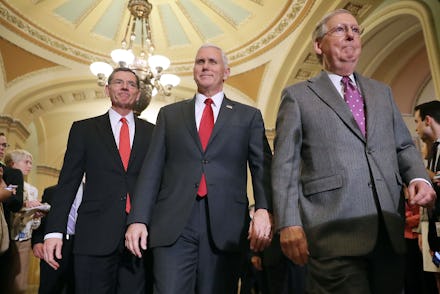Yes, Obamacare could get repealed: Here's what you need to know for 2017 and 2018

The fight over your health care? It has officially arrived.
Vice President-elect Mike Pence talked with Republicans on the Capitol Hill Wednesday while President Barack Obama met with Congressional Democrats in a closed-door meeting. Both leaders were essentially helming pep-rallies to inspire their sides as the fight picks up to dismantle the Affordable Care Act, Obama's signature health care legislation.
In a press conference following his meeting, Pence said repealing the legislation and replacing it with a market-driven replacement will be the new administration's top priority.
"The first order of business is to repeal and replace Obamacare," Pence said, according to Marketwatch.
While Republicans have been salivating for years over gutting the legislation — which has brought 20 million people, including more than 6 million young adults, onto the health care rolls — their best opportunity is now.
Why?
With the inauguration of Donald Trump on January 20, Republicans will be in charge of both the House and the Congress as well as the executive office.
Congress can repeal major parts of the legislation using the budget reconciliation process.
This somewhat rare tactic is used when a party wants to speed up movement on legislation which affects taxes or spending — like entitlement programs including Medicare or Medicaid.
Here is what a repeal of the Affordable Care Act could mean for you.
Your health care plan should not be affected until 2018 — at the earliest.
Any changes that are enacted will not affect you until November, when open enrollment season comes around again.
Considering there's not a clear or consistent replacement plan on offer by the Republicans (or from Trump's top pick for Health and Human Services, Georgia Rep. Tom Price), it could be awhile before a new plan is in place.
Even just the language Wednesday, for example, varied — from House Speaker Paul Ryan calling for "relief" from the Affordable Care Act to Mike Pence demanding its "repeal."
While the general change Republicans want to make is to shift health care to a market-based system, there are many details to hammer out. Even among Republicans, there is disagreement about the timeline.
Trump and Pence are calling for immediate action. But some Republicans, including Senator Susan Collins of Maine, have concerns about repealing the ACA without simultaneously offering a replacement — a process that would take some time.
Another group, members of the House Freedom Caucus, say they will vote against any replacement that is not guaranteed before the mid-term elections in November 2018.
"It would have to be an unbelievable, compelling case to suggest we need more than two years to repeal and replace the Affordable Care Act," Rep. Mark Meadows of North Carolina told Marketwatch.
But lawmakers will face the same challenges that the Democrats faced in creating the Affordable Care Act.
Specifically: How do you keep enough healthy people buying insurance to cover the costs of the sickest?
The Democrats' solution was the individual mandate, which requires Americans to have health insurance or pay a penalty ($695 per adult or 2.5% of household income, whichever is greater).
The Republican solution is — at the moment — unclear.
Who could be hurt by a repeal of the Affordable Care Act?
Women are notable beneficiaries of the Affordable Care Act — and they could be among those who lose the most from its repeal.
The ACA requires that birth control is free of cost for women, and it also mandates that women cannot be charged more than men for the same care.
Those parts of the ACA have no guarantee of showing up in a replacement plan, especially given Republicans' resistance to the birth control coverage.
Trump's pick to head Heath and Human Services, Rep. Tom Price, is unlikely to help fight for stronger reproductive rights: Price has a 0% rating from the Planned Parenthood Action Fund and a 100% rating from the National Right to Life Committee.
But its not just women: People who work part-time at small businesses could also be affected by the repeal of the Affordable Care Act.
As part of the existing law, employers with at least 50 workers are required to provide affordable insurance to their employees who work more than 30 hours a week. It's called the employer mandate.
And if Obamacare goes, that could go, too.
People who work at these businesses and log between 30 and 40 hours a week may no longer have coverage; employers could opt to offer health care only to those working full-time, at 40 hours or more. That would leave many part-time workers uninsured.
Also hit hard following a repeal could be workers at businesses with fewer than 50 workers.
Although employers at companies this size are not required to provide health care, their workers benefit from the changes the Affordable Care Act brings to the individual market.
The ACA says insurance companies cannot deny you coverage because of a pre-existing condition, for example.
Obamacare also set out 10 areas it considered to be essential health benefits and which it requires insurance plans to cover.
These include maternity care, mental health and prescription drugs — and preventative care, including basic wellness services and screenings.
These protections could be reversed under repeal.
In other words? You might want to call your doctor and get cracking on scheduling that annual physical exam. And make sure your insurance doesn't charge you a dime while the law is still on your side.
Sign up for The Payoff — your weekly crash course on how to live your best financial life.